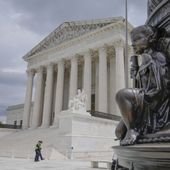Former National Security Adviser Samuel R. Berger, fined $50,000 for taking classified documents from the National Archives, hid the papers under a construction trailer where they later could easily be retrieved, a report yesterday said.
The National Archives Office of Inspector General said that during a 2003 visit to the facility, Mr. Berger left the building unescorted for a break, during which time he “placed the documents under a trailer in an accessible construction area outside Archives 1 (the main Archives building).”
The report said Mr. Berger acknowledged that he later retrieved the documents from the construction area and brought them to his office.
Mr. Berger, who served as national security adviser under President Clinton from 1997 to 2000, pleaded guilty in April 2005 to a misdemeanor charge of unauthorized removal and retention of classified material. The material included documents outlining the government’s knowledge of terrorist threats in the United States during the 2000 New Year’s celebration.
He was fined $50,000 by a federal judge, ordered to perform 100 hours of community service and barred from access to classified material for three years. The top Clinton adviser had faced a year in prison and a $100,000 fine, but a plea agreement in the case reduced the fine and kept him out of jail.
The removal occurred while Mr. Berger was preparing to testify before the September 11 commission investigating intelligence and security failures, raising questions about whether he was attempting to cover up the Clinton administration’s counterterrorism policies and actions.
Mr. Berger, with authorization from Mr. Clinton, also was reviewing National Security Council documents on Osama bin Laden and al Qaeda, Sudan and related presidential correspondence to prepare for testimony before the House and Senate intelligence committees.
In his televised testimony to the September 11 commission, Mr. Berger said the Clinton administration’s “sustained attention” to terrorist threats and “rigorous actions” had foiled a terrorist threat in December 1999 to bomb airports in the United States.
But Attorney General John Ashcroft told the commission that he saw some of the documents that had turned up missing from the Archives and that the plot was stopped with “luck playing a major role.”
During his sentencing in September, Mr. Berger told the court that he let “considerations of personal convenience override clear rules of handling classified material.”
“In this case, I failed. I will not again,” he said.
The inspector general’s report, first made public by the Associated Press, said that when Archives employees first suspected Mr. Berger was removing classified documents, they failed to notify any law-enforcement agency. It also said Archives employees did not feel that there was enough information to confront someone of Mr. Berger’s stature.
The report said Mr. Berger removed four documents from the facility.
The government charged that Mr. Berger “knowingly removed classified documents from the National Archives and Records Administration and stored and retained such documents at places,” including his office in the District.
Mr. Berger initially claimed he took the documents as the result of an “honest mistake,” but later admitted that he placed the classified records in his pants and jacket and put other classified documents in a leather portfolio.
In October, several top House Republicans asked for an investigation and committee hearings to determine which documents were “destroyed, removed or are missing” as a result of Mr. Berger’s admitted theft.
In a letter to the House Government Reform Committee, the lawmakers asked Chairman Thomas M. Davis III, Virginia Republican, to investigate whether there was criminal misconduct in the removal of the classified documents by the Clinton administration official.
Democrats will assume control of Congress next month, and the request for an investigation is expected to be shelved.



Please read our comment policy before commenting.